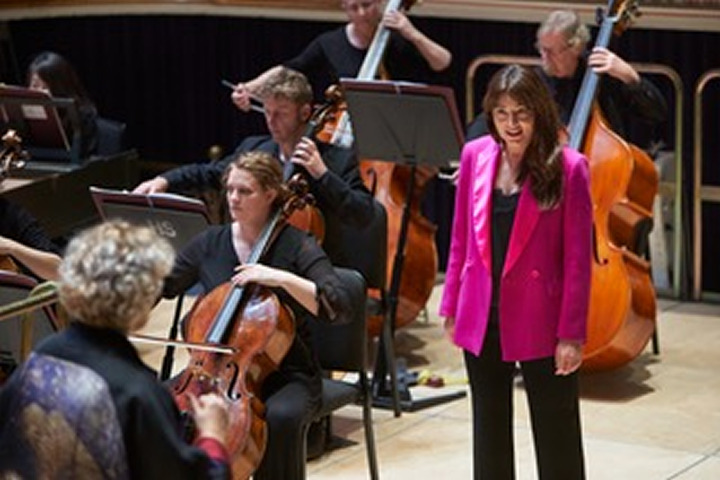| Opera Reviews | 28 April 2024 |
A minimalist staging that makes its markby Catriona Graham |
|
Gluck: Orfeo ed Euridice |
|
 |
|
|
What is the difference between a concert staging and a fully-staged performance of an opera? On the evidence of Opera North’s revival of their production of Gluck’s Orfeo ed Euridice, in a concert staging the chorus get to wear their specs. Also, no director is credited, instead Sophia Gilpin is named for ‘concert placing'. Otherwise, it could be a minimalist staging, with a star-spangled black backcloth, a couple of platforms for set, and the chorus and Orfeo dressed – appropriately for mourning – in black. And what a sound the chorus makes – rich and eloquent in what is a conversation with the grieving Orfeo, whether they are nymphs and shepherds also mourning the death of his wife Euridice, Furies, or spirits. When, in Act 2, Orfeo begs the Furies for pity, their implacable response of ‘No’ is almost frightening. Polly Leech’s Orfeo* wears his heart on his sleeve. His fervent emotions are flooding out, his grief and distress patent. Leech’s lowest notes are less strong, but there is no doubting the sincerity of Orfeo’s sorrow. Once (temporarily) re-united with Euridice, the torture of being unable either to look at her or to explain why he must not look at her is dramatically portrayed. Fflur Wyn’s Euridice is almost at peace in Elysium, almost reconciled to her death. As Orfeo leads her back to Earth, she is confused by his apparent detachment, given all they have been through, and their conversation rapidly descends into a classic communications failure. When the little self-control Orfeo retains finally snaps, and Euridice dies a second time, the black-out which extinguishes her but leaves Orfeo lit is shocking in its suddenness. Then comes Orfeo’s Big Moment, the song everyone knows – Che farò senza Euridice? Leech rises to the occasion, pouring out all Orfeo’s desolation and despair in four minutes of concentrated anguish. But rescue comes – as it has before – in the form of Amore, sung by a bright-voiced Daisy Brown in a puce jacket, the only splash of colour on the stage. Having let Orfeo attempt to rescue Euridice from Elysium, she decides he has suffered enough, and can be re-united with his wife after all. The lightness of her voice is a good contrast with the richness of Leech’s mezzo-soprano, and conveys an edge of capriciousness. The orchestra responds well to conductor Antony Hermus; the Dance of the Blessed Spirits may be cheesily popular, but hearing the interweaving harmonies and instrumentation so clearly is a delight. *Orfeo was sung by Polly Leech on 26th October and by Alice Coote on all other dates. |
|
Photo © Justin Slee |
|







